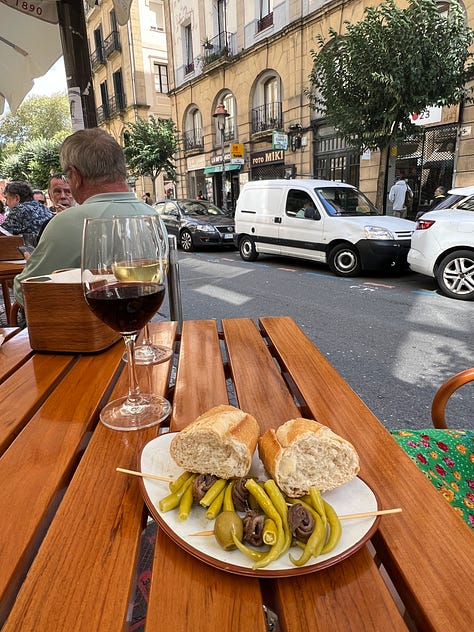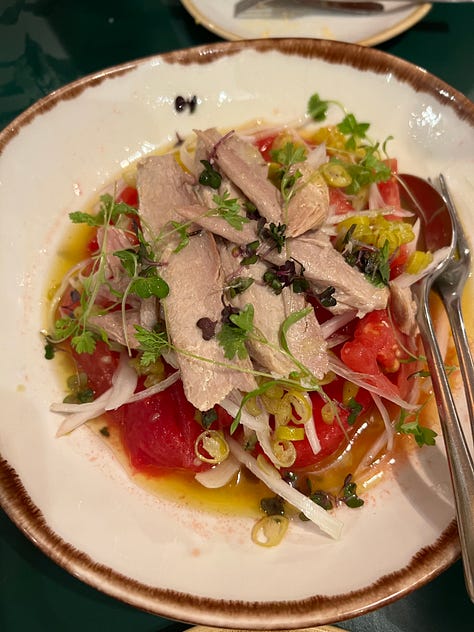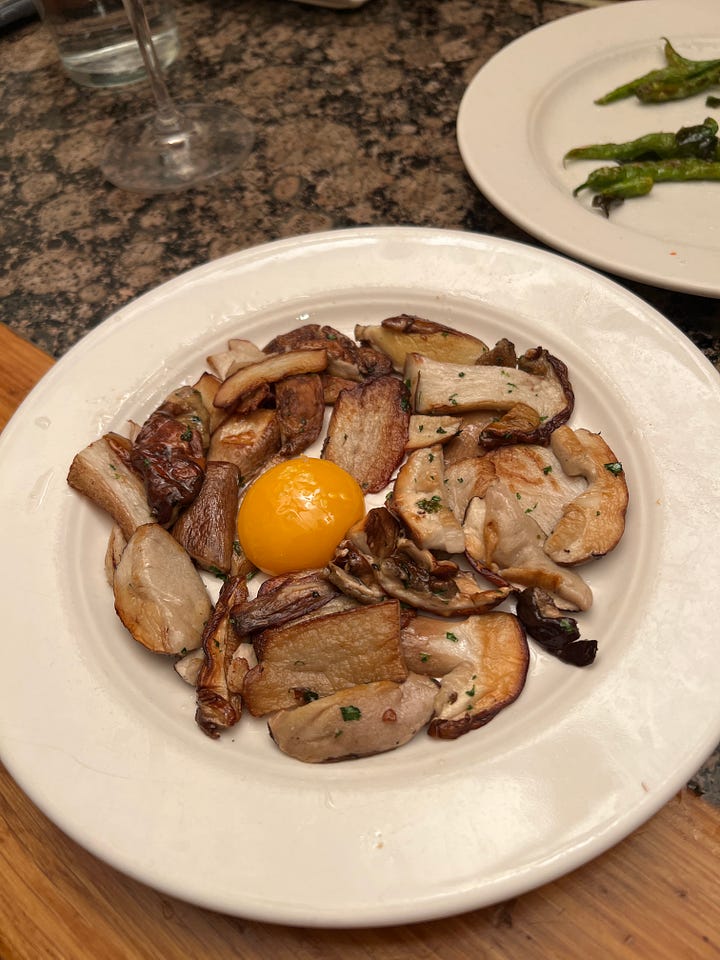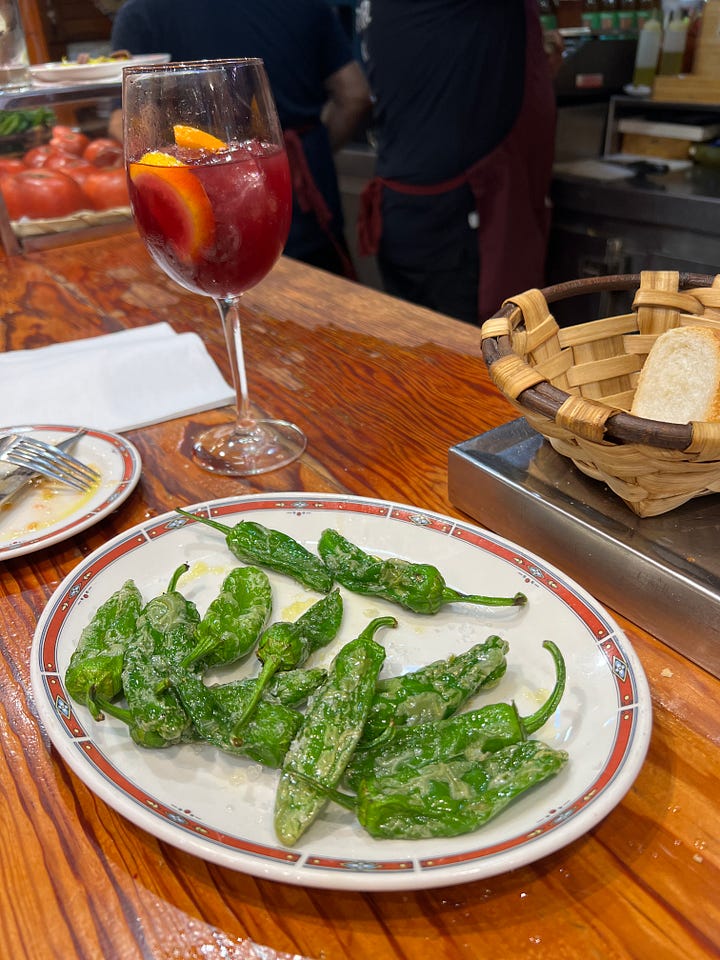Issue #46: The lifelong desire to become a 'We'
When being a party of one doesn't feel like enough.
I was midway through writing a list of San Sebastián travel recommendations for my aunt & uncle when I realised it: my pronouns had changed. After spending the past week on holiday with a friend (in that same Basque country location) – and, before that, a week away with my mum – I’d changed from my usual ‘I’ self to a different entity altogether: a ‘We’. We went to this restaurant twice in four days. We decided to skip this boat tour. We had the anchovies here. These holidays became, accidentally, a holiday from being just myself: a solitary ‘I’.
Oh, we’ve all been there though, haven’t we? In the throes of a new relationship:
We love Nando’s!
We’re busy that weekend
We don’t go the cinema that much
We’d love to see you!
It’s one of the easiest grammatical holes to fall into – and we do so unconsciously. Particularly during that infatuated honeymoon period of a relationship, it just makes sense. Say, you’re spending all your time together, waking up together, texting throughout the day. Before long, saying “I” would seem, practically, exclusionary.
The word itself tastes delicious, bringing with it a rush of comforting dopamine. We, we, we!
But then…
You’ve been single for a couple of years, and you start to feel slightly spiky during interactions with friends.
‘What did you get up to this weekend?’
‘So we just stayed in on Friday, and then…’
You’re the odd one out: they’re part of a ‘We’, with a phantom someone you haven’t even met yet, or don’t know well. You’re relegated from knowing the entirety of a person – from their pizza order down to the exact role they played in their school’s Year 6 stage adaptation of The Wind in the Willows – to knowing roughly 50% of a two-man band.
‘I’ vs. ‘We’: A question of circumstance
‘There’s no way to say this without seeming petty or pathetic,’ says the character of Seema to Carrie in And Just Like That season 2. ‘[...] Carrie, you’ve already become a “We”’. The context, for those who haven’t watched it, is that Carrie reconnects with her ex, Aidan, in a whirlwind romance. This complicates her plans to spend the summer at a rented house in the Hamptons with her close friend, Seema, who feels hurt and forgotten. Carrie, meanwhile, is trying to introduce Aidan to her friends: ‘We’d love to take you out for dinner’.
It’s one of the best scenes in the entire series, because of its sensitive treatment of a taboo issue: the shift that sometimes takes place when a close friend gets into a new relationship: the inevitable mixed bag of being happy for them, but struggling with the transition period. And, as the script rightly identifies, the feeling is often contained in those ‘petty’ details – like the way you feel when your friend’s language shifts. As Amy Key wrote in a British Vogue article about this exchange:
‘Coupledom isn’t just a relationship, it’s a language. It can make your own “I” feel paltry and vulnerable – even if you cherish being able to say “I”, even if it can feel freeing and defiant.’
Of course, that’s subjective. To someone who’s single and would like to be otherwise, ‘We stayed in on Friday night’ has a cosy sound to it, whereas ‘I just stayed in’ can sound lacking when said aloud (even if it didn’t feel that way at the time). And yet, I suspect the independence and solitude implied by ‘I’ might – to someone who craves these things, but spends their time and energy on others – have its own kind of desirability.
More often than not, one’s choice of ‘I’ versus ‘We’ is a reflection of their everyday circumstances rather than their existential beliefs, or a stick to beat others with. I often use ‘I’ because, day-to-day, I’m by myself, bumbling around Tesco Express or taking the Tube. If I were married, a parent to young children (and/or a furry animal), or a member of a hippie community, it would inevitably be ‘We’. That’s just how it is.
This isn’t about policing one’s own language, or the language of others. Rather, it’s about examining the feelings contained within the simple words of ‘I’ and ‘We’ – which I don’t think can ever be petty or pathetic, but insightful and valid.
The impact of ‘I’ vs ‘We’ on your relationship
‘There are “I” couples and there are “We” couples’, a married woman in her seventies once told me. She was referencing hers and her husband’s relationship (in retirement, they’d pursued their own hobbies – and holiday-ed separately once a year), compared to a couple they know who golfed together every day. Perhaps, for some couples, it’s that polarised – but I suspect it’s more often the case that it fluctuates over the years, or indeed decades, of a relationship. With infant children, you might – practically – be relying on one another a ‘We’ unit, even if you’d like a little more independence; in retirement, you might well become more of an independent ‘I’ couple; it’s simply a question of the amount of time you spent together. It’s nice to imagine that a happy, long-term marriage might prove that elastic.
It seems that relationships, beyond the honeymoon period, will benefit from a constant negotiation of ‘I’ vs ‘We’. On the one hand, research has shown that ‘self-concept clarity’ – a psychological term for that feeling of ‘me-ness’ – correlates positively with married partners’ respective relationship satisfaction. Effectively, know thyself, have a better marriage. There’s also this article in GQ warning of the link between ‘we’ statements and co-dependency (although it doesn’t say anything about golfing together through retirement – so hopefully Barbara and Bob are off the hook).
However, language matters – and a little bit of ‘We’ can go a long way. When approaching a difficult conversation with your partner, consciously using ‘We’ rather than ‘I’ keeps your relationship healthy and interdependent, according to a 2018 study. This is also a tactic employed by managers (‘If you want to be the boss, say “we” not “I”, suggests an article in the Harvard Business Review).
‘The authors found use of the pronoun “we” corresponded to greater relationship satisfaction, longer relationships, more positive interactions, better mental and physical health, and greater self-care.’
I also came across a fascinating piece in Newsweek – which suggests that individuals with ‘secure’ attachment styles are more likely to use ‘We’ language when describing activities in their romantic lives, whereas anxious or avoidant types tend to use ‘I’ statements. I wonder if this says something about my easy ability to fall into ‘we’ after spending lots of time with close friends, with whom I generally feel a textbook ‘secure’ feeling of attachment.
The hidden lure of ‘We’
I think the reason that the ‘I/We’ distinction absorbs me is because, deep down, I relate to that hunger to feel like a ‘We’ with someone else. This goes beyond romance – it’s about self-obliteration. Imagine the peace of dissolving into someone else, your edges indistinct from theirs. Your faults cushioned by their strengths. Surely that’s a universal, primal craving. ‘We’ promises insurance against loneliness; an ever-present teammate, cheerleader, support squad and witness. And it’s not just romantic relationships that offer this promise, it’s also – depending on your vantage point – friendship, religion, cultural communities. ‘We’ can, technically, refer to any number of people.
It’s comforting – but it’s also a fantasy. However much I dip in and out of ‘We’, I am, as we all are, destined to be an ‘I’ (it occurs to me, as I write this, how that one-letter word is pictographic in the way Chinese characters are, denoting a stick person standing to attention). And that’s both a curse and a blessing. I’ve felt the loneliness of ‘I’ my entire life and yet the older I get, the more I recognise it has its own distinct lure.
I am the sole witness to my entire life
‘I’ is that intuitive feeling in my stomach about a career opportunity, an interpersonal relationship, a proposed activity
‘I’ is the opinion I form about a book, play or film – before anyone else weighs in with theirs
‘I’ am the person who’s written a journal for the past 24 years, feelings committed privately to a page
I’m the person with whom I’m having an ongoing conversation in my head, to the extent that I sometimes start laughing spontaneously in the street (a revelation that, I realise, might sound, or at least look, a little crazy)
Over the years, I’ve learnt the value of returning to that ‘I’ – of regularly getting quiet enough to hear it; alone. However much ‘We’ I have in my life, I know my sense of ‘I’ is a non-negotiable. It’s not one or the other; it has to be both.







Consuming…
Everything. Honestly. San Sebastián had some of the most delicious food I’ve eaten in my whole life. Highlights included beef tomato salad with bonito, a delicious tuna-mackerel esque fish; gildas (a snack comprised of chilli pepper, anchovy and olive on a cocktail stick); guindillas, delicious green peppers like a smaller version of padrón; and the Basque cheesecake that’s all over TikTok. Oh – and let me know if you’d like a copy of that list I wrote for my aunt & uncle (just reply to this email).
Reading…
I just borrowed Song of Solomon by Toni Morrison (named #89 in The Guardian’s top 100 novels of all time) from my workspace’s library, which is curated by Libreria – the gorgeous Spitalfields bookshop. I’m only a few pages in, but wanted to share one of its most-quoted lines, which for me has always resonated:
‘You're turning over your whole life to him. Your whole life, girl. And if it means so little to you that you can just give it away, hand it to him, then why should it mean any more to him? He can't value you more than you value yourself.’
Trying…
To beat the post-holiday blues by booking tickets for cosy autumnal book events in London – so let me know if you have any recommendations! I’ll also be interviewing
this forthcoming Saturday 7th October at Henley Literary Festival, so do book tickets if you’d like to come along.Listening
To Sara Pascoe on the How To Fail podcast. I’ve always enjoyed her work, but I’m cheerleading ten times harder after hearing about her resilience through enduring both fertility struggles and Edinburgh Fringe Festival as a female comedian year in, year out.








As a female often deals with male counterparts, I never cease to marvel at how men have a tendency to say "I" or "my", when in fact they are married, have 5 children and 3 mistresses. When this happens, I tend to ask "and did your wife enjoy it as well?"
I adored this! When somebody asks me how I am at the moment I keep saying ‘we’re ok’ referring to me and my baby and toddler. Where has this come from?! 🤯